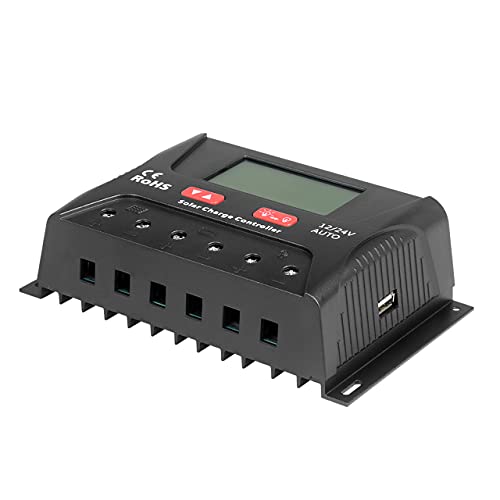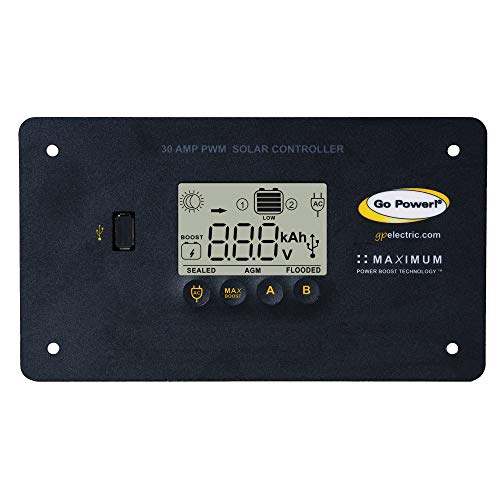Hey! This site is reader-supported and we earn commissions if you purchase products from retailers after clicking on a link from our site.
If you don’t have a solar charge controller, there’s a good chance that you are losing battery power each night. While every RV and RVer will have different needs, there are a few key things to look out for when trying to choose a solar charge controller.
Spending time researching and trying out various solar charge controllers can be frustrating and expensive. I’ve compiled a list of the best solar charge controllers available and discuss each one in-depth.
Stay Powered Up With These Solar Charge Controllers
| Best Solar Charge Controllers for Your RV | Best For: |
| HQST 30A PWM Negative Ground Solar Charge Controller | Overall Value |
| WindyNation P30L PWM | Multifunction Controller |
| Renogy 30A Wanderer | Features |
| Victron MPPT SmartSolar Charge Controller | Most Advanced |
| EPEVER MPPT Charge Controller | Efficiency |
| Go Power! GP-PWM-30A | Versatility |
Reviews For Each of Our Top Picks
Ready? Let’s dive into our opinions of our top recommendations.
Best Overall
HQST 30A PWM Negative Ground Solar Charge Controller
Let’s start with the best overall. This one gives you the most features in general with two USB ports, automatic detection of 12v versus 24v system voltage, overcharge and overload protection, as well as automatic light control, which can prevent battery drain.
While all of these features are beneficial and make this our top pick overall, there may be a couple of drawbacks. Not everyone may find the instructions clear, and this particular model may not work the best in high-humidity environments. Plus, the automatic light shutdown won’t work if the battery is at full capacity. Instead, the lights turn back on, even after the programmed shut-off time.
- 【Function】HQST 30 Amp solar charge controller is an intelligent and multifunctional solar charge...
- 【Intelligent regulator】12V/24V system voltages are automatically recognized. With temperature...
- 【LCD screen】It provides a dot matrix graphic LCD screen and a human-machine interface with a...
Last update on 2024-07-13 / Affiliate links / Images from Amazon Product Advertising API
Pros:
- Temperature compensation
- Charging parameters are automatically, but can still be manually reset to satisfy your needs.
- Easy to navigate interface
- Overcharge, overload, short circuit, and reverse-connection protection
- Auto-sensing light control turns lights off during the day to save power. In low sun environments, the garden light is activated.
Cons:
- Unclear instructions until you look through them a few times
- The light sensor won’t activate if the battery is full
- The unit may struggle in high-humidity environments
Best Multifunction Controller
WindyNation P30L PWM
If you’re looking for multifunction, the WindyNation P30L PWM may be for you. Like most models, it offers overcharge, short-circuit, and reverse polarity protection. You can configure it depending on the battery you have (lead-acid, AGM, gel, and more), and has a temperature sensor.
Unfortunately, the warranty is a little short at only a single year and it doesn’t display how much battery life is left. The two-stage charging also might not get your batteries to full capacity, which can be frustrating.
- WindyNation P30L PWM 30 amp solar charge controller prevents battery from being overcharged and...
- Electronic protection: overload, short circuit, and reverse polarity protected
- LCD digital display provides system information (amperage, voltage, temperature, load control etc.)
Last update on 2024-07-13 / Affiliate links / Images from Amazon Product Advertising API
Pros:
- Ample protections
- You can configure it based on your battery type
- Temperature sensors prevent your battery from overheating
- Adjustable system settings make it pretty customizable
Cons:
- Only one year of warranty
- It doesn’t show you the remaining percentage of battery life
- The two-stage charging may not max out the charge on your batteries
- It’s a little lightweight for our tastes
Best Features
Renogy 30A Wanderer
If you want extra features, the Renogy 30A Wanderer is a solid choice. It’s a negative ground controller, so it obviously works best with a negative ground system. It protects against overcharging, discharging, short-circuiting, and reverse polarity. It also has good temperature protection and is pretty easy to set up.
A drawback is that it is a small unit and may not work with large amps. It also won’t power on if it’s not connected. Plus, it isn’t insulated against weather, so you can’t just leave it out in the rain.
- The Wanderer is a negative ground controller. This ensure compatibility with any negative ground...
- 4 Stage PWM charging (Bulk, Boost, Float, and Equalization) prevents batteries from over-charging...
- Compensates for temperature, automatically corrects charging and discharging parameters, and...
Last update on 2024-07-13 / Affiliate links / Images from Amazon Product Advertising API
Pros:
- It has LED indicators
- The Wanderer has a four charging stage
- It’s pretty durable
- A great unit if you don’t need too much power
Cons:
- The controller is smallish, which is difficult to navigate
- Really only works with 12-volt panels and wires no larger than 30 amp input
- May not be weatherproof
- Won’t power up without being connected to the battery
Most Advanced
Victron MPPT SmartSolar Charge Controller
Want smart tech features? The most advanced solar charge controller on the market? The Victron Maximum PowerPoint Tracking (MPPT) is probably your best bet.
It’s got all you need: Bluetooth, a great app so you can control it from your phone and improve energy collection by up to 30 percent, programmable voltage limit, and a battery life algorithm to help you keep track of the health of your battery. The charging levels to get as close to 100 percent as possible.
There are, however, some features not everyone may be wild about. If you’re big on privacy, you may not like having to have your location turned on when using the app. The controller also doesn’t have an LCD screen, and you can’t use wires larger than 10AWG.
- SMART SOLAR CHARGE CONTROLLER: Solar charge the smart way with the Victron Energy SmartSolar MPPT...
- SPEED & EFFICIENCY: With lightning-fast optimum power point tracking and intelligent charge...
- SYNCHRONIZED CHARGING: Multiple SmartSolar MPPT charge controllers can synchronize to behave as one,...
Last update on 2024-07-13 / Affiliate links / Images from Amazon Product Advertising API
Pros:
- Great app and Bluetooth capability
- Improves your energy collection
- Being able to set a voltage limit for charging helps prevent overloading and short-circuiting while also improving battery life
- Battery life algorithm helps you keep track of the health of the battery
Cons:
- Can’t use wires larger than 10AWG
- You have to have location services on when using the app
- No LCD screen
Most Efficient
EPEVER MPPT Charge Controller
If you “run a tight ship” then you love products that boast efficency. The EPEVER gives you conversion efficiency of up to 98 percent while offering high tracking efficiency of up to 99.5 percent thanks to its MPPT technology. It protects against temperature overload, reverse polarity, overload, reverse current, short-circuiting, overcharging, and over-discharging.
Unfortunately, even with its advanced tech, it’s not right for everyone. It’s of the more expensive models, the software can sometimes be temperamental, and screen display can be buggy.
- Negative Ground Charge Controller featuring advanced MPPT technology with high tracking efficiency...
- This MPPT Controller protection built-in against reverse polarity, overcharging, over-discharging,...
- The Tracer AN's charging process has been optimized for long battery life and improved system...
Last update on 2024-07-13 / Affiliate links / Images from Amazon Product Advertising API
Pros:
- Maximizes efficiency with EPEVER’s MPPT tech
- Fantastic protection
- Can check on how energy statistics in real-time online
- LCD screen that displays voltage, amperage, and other important data
Cons:
- One of the pricier models
- May have software glitches
- A few instances of issues with getting the screen display to work
Most Versatile
Go Power! GP-PWM-30A
This model may be the most versatile. Not only does it have USB ports, but you can charge various devices with it, including tablets, cell phones, and even laptops. It’s got four-stage charging that protects against overcharging, an LCD backlit screen, and plenty more to make it an attractive choice.
To compensate for all of those great features is a hefty price and the chance that it may not be quite as durable as other choices. With so many technical features, it’s understandable why it might be more likely to malfunction.
- 30 amp pulse width modulated digital regulator adjustable for Lithium, wet cell, AGM, and gel...
- Full 4 stage battery bulk absorption and float with an equalize for wet cell batteries
- Capable of handling 570 watts of solar
Last update on 2024-07-13 / Affiliate links / Images from Amazon Product Advertising API
Pros:
- It has a backlit LCD screen
- Two USB ports so you can charge many different devices
- The Go Power! has connections for two batteries
- Inverter interface that is easy to use
- Longer warranty than other models
Cons:
- More expensive than some other models
- May be more likely to malfunction
- Some RVers have experienced lower charge rates
- The screen can be difficult to read
Recap: The Best Solar Charge Controllers for Your RV
- HQST 30A PWM Negative Ground Solar Charge Controller – Best Overall
- WindyNation P30L PWM – Best Multifunction Controller
- Renogy 30A Wanderer – Best Features
- Victron MPPT SmartSolar Charge Controller – Most Advanced
- EPEVER MPPT Charge Controller – Most Efficient
- Go Power! GP-PWM-30A – Most Versatile
Buying a New Solar Charge Controller: What to Look For
There are plenty of factors to think about before you buy a solar charge controller for your RV. Here are some important ones to consider.
Safety Comes First
When I’m in the market for a new solar charge controller, the most important factor is safety. Solar power is still an electrical charge, so I want to protect myself and my RV, especially considering how quickly solar-powered fires can spread.
With that in mind, I always make sure that whatever option I choose, I understand the instructions thoroughly before trying to connect it to my solar panels and RV batteries. Otherwise, there is a risk that I may do something incorrectly, which could cause a mistake down the line.
Keep Temperature in Mind
Yes, our RVs can go pretty much anywhere, and we can go see anything, but we still need to think of where we’re going to spend the bulk of our time. At least we will when it comes to climate. After all, some charge controllers may work better in warm weather while others perform better in cool climates.
When it comes down to it, it’s just a good idea to remember that MPPT controllers work best when conditions are nice and cool. Contrarily, PWM controllers perform at their peak in warmer weather, so you’ll get the most out of them in hotter areas.
The Extra Features Each Model Offers
Often, when I am having a hard time deciding between which two controllers I want, I’ll make my decision based on the extra bonus features they provide. Often, you’ll need to decide which of these extra features means the most to you to help you make your final decision.
For example, one may divert excess energy to heaters while another automatically turns lights on or off depending on the time of day. One might have a battery temperature sensor, and another has a shore power switch.
The more little bonuses a controller offers, the more likely I am to lean towards it. It makes the decision that much easier, especially if they are otherwise comparable.
Your Specific Amperage Needs
One of the most important things to think about when you’re getting your charge controller is how much energy (watts of power) your solar panels are going to be pumping out. You also may decide in the future to add more to your set up, and thus increase the power you give to your battery bank.
The worst thing you can do is get a controller that can’t handle the amps your panels generate. After all, when you overload your batteries, you shorten their lives.
Take a look at the amp rating of any controller you’re considering and make sure it can handle the output of however many panels you have. You want to get all the juice that they produce and not leave any energy wasted!
Ease of Use
It may be the last thing on your mind, but you’re going to want a solar charge controller that’s easy to use. All the bonus features in the world won’t make up for a product that’s a headache to install, only accommodates small wires, or has a screen that’s too small to read and navigate.
I also keep an eye out for basics like on-off switches and adjustable charge settings. If I can’t turn it off with a switch, that means I have to unplug it completely and then reassemble everything when I’m ready to use it again. Plus, if I can’t adjust my charge setting, that means I can’t adapt the charge controller to the kind of battery I have, whether that’s gel or lead-acid.
You’ll need to have an idea of what’s a dealbreaker for you. Like I mentioned, my must-haves are on-off switches, adjustable charge settings, and a screen that I can read without whipping out my bifocals. Yours could be Bluetooth technology and an app you can use to control your controller remotely. It’s about knowing your needs before you buy.
Frequently Asked Questions
Which Is Better PWM or MPPT?
The type of solar controller you buy can vary depending on the size of your RV as well as your solar panels. Both types of controllers have their benefits and drawbacks. Most of the time, MPPT controllers work best for larger trailers as they pull power directly from the solar panel to ensure that you have the maximum power when you need it. PWM controllers are often cheaper and better for smaller trailers and RVs.
Are Solar Controllers Necessary?
Solar controllers are necessary if you are trying to run your RV off of solar panels or have multiple panels chained together. The amount of power your are expecting can determine the type of controller you buy. It is important that you buy the correct controller for your RV type so that you can always make sure you are getting the most reliable power.










